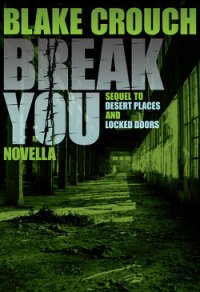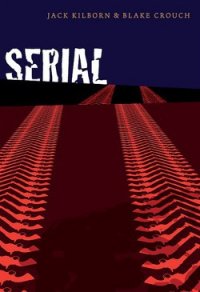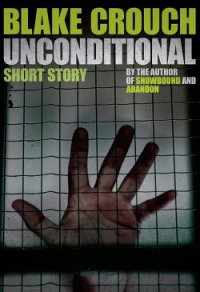Locked Doors - Crouch Blake (книги серия книги читать бесплатно полностью txt) 📗
As Vi opened the door of the Jeep and tossed her purse into the passenger seat, Rufus said, “Miss King, I just wanted to thank you.”
“What for?”
Rufus leaned against the dirty Jeep.
A raindrop splattered on Vi’s cheek.
“Not telling my wife the nature of the crime scene. Maxine isn’t well. She didn’t need to hear about it, and I’m grateful to you. You said you’re from Davidson, North Carolina?”
“Yessir.”
“I know why you’re here. Did my boy…he kill that family?”
Vi shut the door, reached out, touched Rufus’s arm.
“Mr. Kite, we really don’t know at this juncture. That’s the truth.” Rufus nodded, patted her hand. “But would it surprise you if he had?”
The old man exhaled a soft whimper.
“Come back tomorrow,” he said, then walked away through the weeds toward the water.
As she drove away from that morose eroding home, Vi watched Rufus Kite in the rearview mirror. Through falling mist she could see him standing on the bank, staring out across the leaden sound.
33
MY vision faded in upon the cottage cheese ceiling paint of my little room. It was Thursday, my second morning in Ocracoke, and I’d been roused from sleep by the whine of a vacuum cleaner in the adjacent suite.
This was the sixth morning I’d woken in an unfamiliar place. Back home the first thing my waking eyes beheld were the support beams of my cabin—a recurring comfort that soothed me like the familiar respiration of a sleeping spouse. It pained me not to see those rafters, that instead of my home in the Yukon wilderness I was coming to consciousness in this cheerless overblown room with its sand dollar-patterned wallpaper, mawkish painting of a ship in stormy seas above the headboard, and clear glass lamp on the chest of drawers, its base filled with seashells.
Someone knocked on the door and called out in a Spanish accent, “Housekeeping!”
I stumbled out of bed and yelled back through the door, “Not today, thank you!”
From my third floor window I glanced out upon the harbor and the village. The rainfall that had whispered throughout the night had ended and Silver Lake Drive showed patches of dry pavement.
I’d sadly learned yesterday that the free continental breakfast offered each morning was not worth the energy it required to walk downstairs to the dining room and claim it. And since I’d gorged myself on 15-cent shrimp and beer last night at a restaurant called The Pelican, I decided to just skip breakfast and get on with it.
I rented a bicycle from the Harper Castle office and set out from the inn under a moody cloud deck that looked pregnant with rain. In the raw blustery morning I pedaled the ungainly bike alongside the harbor. Across the water, the ferry rammed into the pylons as it tried to dock. I could hear the gulls crying from half a mile away, those ferry leeches.
When I glanced back I could now see the lighthouse peeking above the oaks. Only sixty-three feet high, it rose humbly above its community, a whitewashed brick tower that had stood its ground since 1823, second oldest beacon in the country.
That old timer was selling shells again at the corner of Silver Lake and Highway 12. I smiled and nodded to him as I passed by but he returned my friendliness with a glowering stare.
After several blocks of restaurants and cottages and B&Bs, I turned onto Old Beach Road, then Middle Road, and found myself once again in the residential quarter of Ocracoke.
These yaupon and live oak-lined streets seemed all that remained of the island’s soul.
I came at last to the termination of Kill Devil Road, a worn-out street, cracked and embedded with oyster shells, more than a mile from the nearest residence.
Yesterday, after leaving my car several hundred yards up the street, I’d trespassed through the Kites’ grove of live oaks, right up to the edge of the wood. Lying down in the sand and slimy leaves, cold drizzle soaking in, I’d watched the stone house as the afternoon darkened into evening.
No one came.
No one left.
When night set in I crept up behind one of the contorted live oaks in the front yard and peered through the windows into the living room. Yellowmadder firelight lit the mahogany walls and the feeble frames of an old man and an old woman, statuesque on their old couch, staring into the fire.
After an hour of watching them sit there, inert, I crawled back toward the wood, fully concealed in the luxuriance of weeds that had subjugated the front lawn. Walking back to the Audi, my course of action became clear and though I hated the idea, though it entailed a major gamble, it was my only option.
So now, a day later, I pedaled beyond the mailbox of Rufus and Maxine Kite, down the dirt road that led to their soundside home. Queasy and cottonmouthed, I hadn’t tried anything like this in years. My life in northwestern Canada had been based upon the eradication of risk and I feared I’d lost the nerve for this sort of thing.
A wet veil of Spanish moss brushed through my hair as I exited the grove of live oaks. Through swaying beach grass I rode on, disregarding my palpitant heart, the Pamlico Sound now in full gaping view behind that ancient house of stone.
A heady north wind blew in from the sound.
Whitecaps bloomed in the chop.
That old Dodge pickup truck, parked yesterday under one of the oaks, was gone.
I left the bicycle in the grass beside the wrought iron railing and ascended four steps to the stoop, wishing I had the cold reassuring weight of the Glock in the pocket of my leather jacket. But in all likelihood I wouldn’t need it. From what I’d observed yesterday, Rufus and Maxine Kite suffered lives of lassitude and seclusion.
As I knocked against the door I caught the scent of woodsmoke. Looking up, I saw a thin gray cloud rising out of the granite chimney.
I knocked again.
A minute passed.
No one answered.
Reaching down, I palmed the tarnished doorknob, surprised to feel it turn in my grasp.
The wide oak door swung inward.
34
I stepped inside the house of Rufus and Maxine Kite and closed the door behind me. Having had no prior intention of entering this house uninvited, the part of me grown intolerant of risk screamed to leave.
I called out, “Is anyone home?”
To my immediate right an archway opened into a long living room with a hearth at the far end, on the grate of which glowed a bed of bright embers.
A grandfather clock loomed in a nearby corner. Its second hand moved every four seconds.
I glanced left into the dining room, the table set for three. When I touched the saucer at one of the place settings my finger disturbed an alarming layer of dust. It had settled in the bottoms of the wineglasses, on the surfaces of each plate, even upon the yellowed tablecloth.
Strings of cobweb were everywhere.
I proceeded deeper into the house, past a staircase that climbed into darkness. The foyer narrowed into a corridor and under the stairs I noticed a little door in the wall.
The air grew damp and stagnant, fraught with the odor of must.
I entered the kitchen.
Through the windows behind the sink I could see the sound. On the breakfast table a row of grayish-blue fillets and a thin-bladed filleting knife had been left out on a cutting board beside a glass mixing bowl, half-filled with cornmeal.
Standing over the sink, I looked into the weedy backyard that sloped down to the water. There was a plot of tilled earth near the house that might’ve once been a shade garden, though nothing grew there now.




